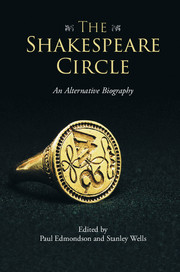Book contents
- Frontmatter
- Contents
- List of illustrations
- List of contributors
- Preface and acknowledgements
- General introduction
- Part I Family
- 1 His Mother Mary Shakespeare
- 2 His father John Shakespeare
- 3 His siblings
- 4 His sister's family: the Harts
- 5 His wife Anne Shakespeare and the Hathaways
- 6 His daughter Susanna Hall
- 7 His son-in-law John Hall
- 8 His son Hamnet Shakespeare
- 9 His daughter Judith and the Quineys
- 10 His granddaughter Lady Elizabeth Barnard
- 11 His ‘cousin’: Thomas Greene
- Part II Friends and Neighbours
- Part III Colleagues and Patrons
- Closing remarks
- Afterword
- Index
- References
2 - His father John Shakespeare
from Part I - Family
Published online by Cambridge University Press: 05 November 2015
- Frontmatter
- Contents
- List of illustrations
- List of contributors
- Preface and acknowledgements
- General introduction
- Part I Family
- 1 His Mother Mary Shakespeare
- 2 His father John Shakespeare
- 3 His siblings
- 4 His sister's family: the Harts
- 5 His wife Anne Shakespeare and the Hathaways
- 6 His daughter Susanna Hall
- 7 His son-in-law John Hall
- 8 His son Hamnet Shakespeare
- 9 His daughter Judith and the Quineys
- 10 His granddaughter Lady Elizabeth Barnard
- 11 His ‘cousin’: Thomas Greene
- Part II Friends and Neighbours
- Part III Colleagues and Patrons
- Closing remarks
- Afterword
- Index
- References
Summary
The first biography of William Shakespeare in 1709 describes the playwright's father as ‘a considerable dealer in wool’ (Rowe 1709, p. ii). Winnow out the subsequent speculative or anecdotal descriptions of John Shakespeare and what emerges is a successful self-made man, active in the business that then dominated the nation's economy. He lived almost two decades longer than his famous son, dying in 1601 aged 71 or so, still litigating on business debts in his final years.
John Shakespeare's apparent standing in the Stratford community changed over his lifetime, but there were solid financial reasons for this as legislation and regulation sought to restrict those who dealt in wool. Both father and playwright son died wealthy landed gentlemen, and the similarities in their handling of money rather than the differences in career choices have, remarkably, been largely ignored. Sufficient records exist to show how the Shakespeare fortune was accumulated, and understanding the economic necessities of their business illuminates much of the family's lives. William Shakespeare was never the romantic poor boy from an impoverished family. To better comprehend the son, we must understand the father. William Shakespeare's ‘works’ are poems and plays; John Shakespeare's ‘work’ was broking wool and lending money. Here I present a revisionist view of the father's business success through reference to Stratford-upon-Avon's borough records, his court cases and an analysis of English woolbroking in the sixteenth century. John Shakespeare was, in reality, a successful and astute individual who voluntarily left public life when his woolbroking business was threatened. Through an analysis of the social, political and economic contexts surrounding the 1576 Royal proclamation against woolbrokers or ‘broggers’, it can be shown that the Shakespeare family never experienced any economic adversity. This has significant implications for understanding William Shakespeare‘s prosperity, shifting the onus away from his artistic endeavours to the family business.
- Type
- Chapter
- Information
- The Shakespeare CircleAn Alternative Biography, pp. 26 - 39Publisher: Cambridge University PressPrint publication year: 2015
References
- 3
- Cited by

